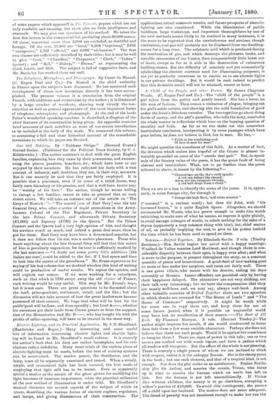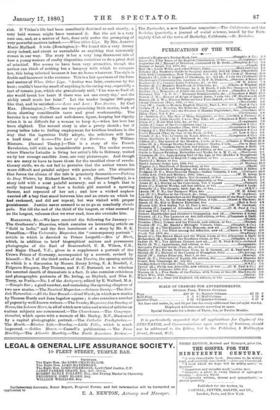NovELs.—Drifted Together. By Elizabeth Savile. 3 vols. (Tinsley Brothers.)—Mrs. Savile
begins her novel with a happy marriage. Winifred de Valine marries Lord Mortimer, and though there is,con- siderable disparity between their ages, is happy ever,after; and what is more to the purpose, is present throughout the story, as a constant quantity of peace and benevolence. A good:deal of love-making goes on more or less under her auspices, and turns out fairly well. There is one great villain, who meets with his deserts, .ending, his days miserably at Monaco. Lesser offenders are punished only by. having their happiness delayed. The characters are not very striking, nor their talk very interesting ; but we have the compensation that they are mostly well-born and, we may say, always well-bred. Among other valuable contents of Drifted Together there, are two ,speeches in, which thanks are returned for " The House of Lords "...and " The House of Commons" respectively. It might be worth while for some one to copy them out, and keep them for use at some future period, when it is possible an ungrateful world may have lost its recollection of their source.—The Root of Alt Evil. By Florence Marryat. 3 vols. (Samuel 'Tinsley.)—The author might improve her novels, if she would condescend to intro- duce into them a few more amiable characters. Perhaps she does not believe that there are such people. Would it be against her conscience to imagine them There are signs of power in this tale; one or two scenes are worked out with much vigour, and have a pathos which all readers will recognise. But the effect of the whole is not pleasing. There is scarcely a single person of whom we are inclined to 'think with respect, unless it is the unhappy Bonnie. She is the strong point in the book ; but one such element, and that of a tragical kind, is not enough. Nor does the plot strike us as satisfactory. Regina Nettle- ship jilts Sir Arthur, and marries the cousin, Vivian, who turns up in time to receive the fortune which an uncle has left to him. But the fortune is not left unconditionally. If .Vivian dies without children, the money is to go elsewhere, excepting a widow's portion of £10,000. To avoid this contingency, she passes off a child upon her husband. The motive does not seem adequate. The dread of poverty was not imminent enough to make her run the risk. If Vivian's life had been manifestly destined to end shortly, a very bold woman might have ventured it. But the act is a very rare one, and, as a matter of fact, done only under the prompting of very powerful motives indeed.—When Other Lips. By Mrs. Annette Marie Mallard. 3 vols. (Remington.)--We found this a very dreary story indeed, and about as unreadable as anything that commonly comes in our way. The story is but a very long drawn-out tale of how a young woman of crafty disposition contrives to do a great deal of mischief. She seems to have been very attractive, though the author can think of nothing but a lamprey with which to compare her, this being selected because it has no bones whatever. The style is feeble and incorrect in the extreme. This is a fair specimen of the form and matter of When Other Lips. "Arlene was faint, overcome by the beat ; couldn't bear the smell of anything in the eating way, especially a tart of tomato jam, which she gratuitously said, Una was so fond of, she would break her heart if there was not one every day,' and the sickly smell made her faint." Let the reader imagine 900 pages like that, and be satisfied.—Lore and Law : Two Stories. By Carl Max. (Remington.)—These are two promising little stories, both of them showing considerable taste and good workmanship. The heroine is a very distinct and well-drawn figure, keeping her dignity when it is so difficult for a woman to keep it,—when her love has been slighted. The second story is also a pretty sketch ; but if young ladies take to finding employment for briefiess brothers in the way that the ingenious Dolly adopts, the solicitors will have a hard time of it.—The Last of the Kerdrees. By William Mintnrn. (Samuel Tinsley.)—This is a story of the French Revolution, told with no inconsiderable power. The earlier scenes, where Blanche Labadie is living her artist's life in Brittany, waited on by her strange satellite Jean, are very picturesque. And though we are sorry to have to leave them for the troubled river of revolu- tionary strife, we do not fail to perceive that the author treats his more difficult and painful subject with genuine art. The situation that forms the climax of the tale is genuinely dramatic.—Fishing in Deep Waters, by Richard Rowlett, 3 vols. (Samuel Tinsley), is a story told with a most painful accuracy, and at a length that is really beyond bearing, of how a foolish girl married a sporting farmer, and repented of her act ; and how a wicked nephew carried off. &ivy that- stood between him and an estate on which he had -reckoned, and did not repent, but was visited with proper punishment. Justice never seemed to us to go so manfestly clan& pede. Not till the end of the third of the longest, or what seemed to us the longest, volumes that we ever read, does she overtake him.



































 Previous page
Previous page